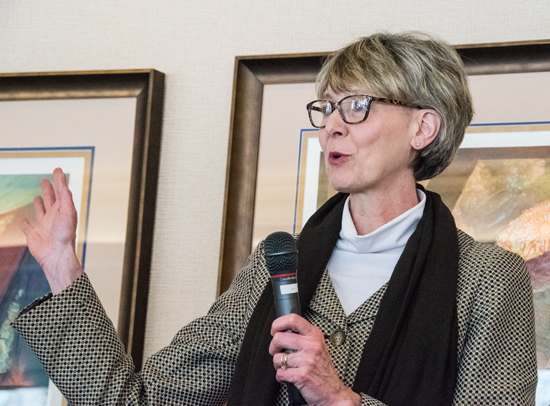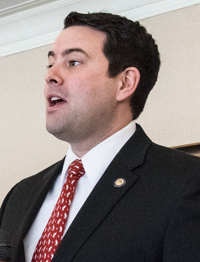Supreme Court candidate at GOP lunch
DAVE MOSIER/independent editor
Van Wert County Republicans hosted an Ohio Supreme Court candidate and also heard from new State Senator Rob McColley on wind energy and other topics during a luncheon held Friday at Willow Bend Country Club.

Judge Mary DeGenaro of the Seventh Ohio District Court of Appeals, is seeking one of two open positions on the seven-member Ohio Supreme Court.
An appellate judge for the past 17 years, DeGenaro earned a bachelor’s degree at Youngstown State University and her law degree from Cleveland-Marshall College. When elected an appellate judge in 2000, Judge DeGenaro was the first Republican elected to the Seventh Ohio District Court of Appeals since 1974.
While judges are not allowed to talk about issues during an election campaign, because of judicial ethical canons, Judge DeGenaro noted that she has always thought of donning her robe as symbolic of removing her personal biases from any decision she makes.
The judge also noted that, while some Americans think courts should create new law through their decisions, she feels an appellate court is there to only decide cases based on existing statutes and case law.
Judge DeGenaro added that what makes the American and Ohio forms of government work is the fact that decisions are made based only on law, not on people’s prejudices and bias.
“This country is based on the rule of law, not the rule of men,” Judge DeGenaro noted during the luncheon.
While a secondary speaker at the luncheon, Senator McColley, who was recently appointed to serve out the unexpired term of Cliff Hite after he resigned because of sexual improprieties, generated much more attention with his controversial recommendations for new wind energy legislation.
McColley first talked about reducing the amount of licensing requirements needed for some professions, noting that some of the current state professional licensing requirements act as a barrier to keep some people out of those professions, rather than ensuring those licensed are competent to do their jobs.

He used current state licensing regulations for a hair stylist-colorist as an example, noting that there are 1,200 separate requirements needed to be met to be a hair stylist-colorist. To compare, only 400 requirements are needed to be an emergency medical technician (EMT) — a person who has other people’s lives in their hands.
However, the topic that generated the most discussion was McColley’s suggestions for dealing with wind farms.
While noting he was in favor of allowing wind farms in Ohio, McColley’s recommendations for wind farm legislation appeared to suggest the opposite.
Noting he feels the issue is more akin to a zoning problem, rather than utility or commercial regulation, McColley suggested that only township residents directly affected by a potential wind farm should be able to decide whether a wind farm is constructed, either through a referendum of a decision by county commissioners or through a special ballot issue on the issue, and also noted that such an issue must pass in all affected townships before it would be approved.
Several people attending the luncheon apparently were not in favor of such restrictive legislation, and a group of people, including Van Wert Area Chamber of Commerce President/CEO Susan Munroe, Van Wert City Board of Education member Cindy Hurless, and several county landowners, spoke with McColley following the luncheon to discuss the issue.
Just how such ballot issues would be paid for, and just who would vote on them, was problematic to those who support wind farms and the financial and economic benefits they provide to an area, while Munroe noted that many of those who benefit from wind farm development, such as school district residents who pay school taxes and city residents who benefit from hotel-motel taxes paid by wind farm construction workers, would not apparently get to vote on whether a wind farm would be constructed.
One landowner also noted that, if only townships affected get to vote, should they also then get to keep all the PILOT (payments in lieu of taxes) generated by a wind turbine project.
Munroe noted that no other electric generation method is treated in this manner, which McColley said was because of the wide area covered by wind turbines, rather than the relatively small footprint of other types of power generation plants.
Some also noted that, if wind turbines are treated as a zoning issue, then mega-livestock operations, which are more like industrial operations than farming operations, should also be treated the same way.
McColley noted that some of his ideas are problematic, adding that any legislation would likely receive amendments before passage.
POSTED: 01/20/18 at 9:11 am. FILED UNDER: News







